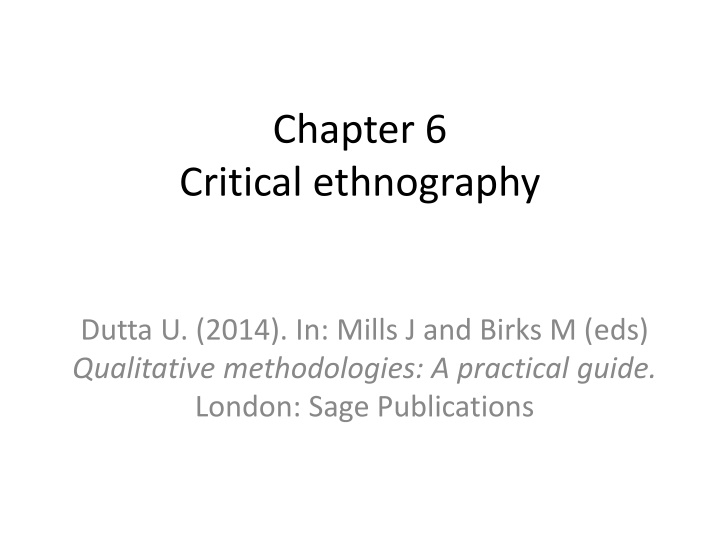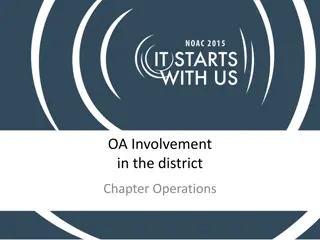
Evolution of Critical Ethnography: A Practical Guide
Explore the evolution of critical ethnography, its philosophical assumptions, and the role of the ethnographer in research. Dive into the ethical and validation issues in ethnographic research and the range of methods for data collection and analysis. Discover the historical overview of ethnography from traditional descriptive studies to modern social justice commitments rooted in qualitative inquiry.
Download Presentation

Please find below an Image/Link to download the presentation.
The content on the website is provided AS IS for your information and personal use only. It may not be sold, licensed, or shared on other websites without obtaining consent from the author. If you encounter any issues during the download, it is possible that the publisher has removed the file from their server.
You are allowed to download the files provided on this website for personal or commercial use, subject to the condition that they are used lawfully. All files are the property of their respective owners.
The content on the website is provided AS IS for your information and personal use only. It may not be sold, licensed, or shared on other websites without obtaining consent from the author.
E N D
Presentation Transcript
Chapter 6 Critical ethnography Dutta U. (2014). In: Mills J and Birks M (eds) Qualitative methodologies: A practical guide. London: Sage Publications
Learning objectives Outline the evolution of critical ethnography Discuss the philosophical assumptions underlying ethnographic approaches Identify the links between epistemological positions and specific methods
Learning objectives Describe the critical role of the ethnographer in the research process Explore key ethical and validation issues in ethnographic research Identify the range of methods available for data collection, analysis, and dissemination of ethnographic research
Historical overview Ethnography is derived from the Greek ethos, meaning nation or people and graphia meaning writing Traditionally ethnography refers to the descriptive study of other (usually non- western) cultures Ethnography has come to mean different things in different historical and political contexts
Historical overview In this chapter ethnography refers to a methodology rooted in the humanistic and social justice commitments of qualitative enquiry (Denzin and Lincoln, 2011) May be traced to classical anthropological efforts to understand & elaborate culture Evolved as a social science methodology during the 19thand 20thcenturies
Historical overview During the mid to late 19thcentury, recognized need to acquire knowledge of cultures through direct participation (Tedlock, 2000) Development linked to work of two anthropologists Franz Boas and Bronislaw Malinowski
Historical overview Commitment to a comprehensive understanding of culture through participant observation over extended periods of stay in the field 1920s - scholars at the University of Chicago changed the focus from study of cultures of foreign lands towards study of urban landscapes
Historical overview 1960s and 1970s - ethno methodologies and symbolic and interpretive anthropologies were two major influences on ethnography 1980s ethnography became politicized with influence of feminist, critical, Indigenous and postmodern approaches
Historical overview Distinct shift in ethnography toward studying existing social suffering and inequities Contemporary moves in anthropology towards activist, civic and public agendas
Philosophical underpinnings 19thcentury ethnography anchored in philosophy of realism (reality exists independent of the researcher) (Hammersley, 2002) Aim was to produce accurate accounts of different cultures and communities Social constructivism was a competing epistemology
Philosophical underpinnings Social constructivism contended that the research product is co-constructed by the researcher and participants Range of epistemologies reflected in variations of ethnographic approaches Emergence of explicit social justice agendas such as critical, collaborative, performance and activist ethnography (Lassiter, 2005; Madison, 2005; Madison, 2012; Sanford, 2006; Tedlock, 2011)
Aligning philosophy and methodology with purpose Need to reflect on why you may choose ethnography Need to reflect on which specific ethnographic approach may be the most suitable for your study Ethnographic approaches include: critical ethnography, performance ethnography, collaborative ethnography, public and activist anthropology
Aligning philosophy and methodology with purpose For example, you may feel an ethical responsibility to address processes of unfairness or injustice in a specific domain Critical ethnography may therefore be the most appropriate methodological approach to your study
Aligning philosophy and methodology with purpose Critical ethnography: involves challenging institutions and regimes that limit choices, constrain resources and marginalize identities is committed to the construction of knowledge from the perspective of those who are subjugated
Positioning the researcher A cornerstone of ethnography is the researcher s deep immersion in the community or context of the study Need to continually examine and evaluate your role as researcher in relation to specific social contexts by asking when, where, how am I? (Trinh, 1991: 157)
Positioning the researcher Need to take a reflexive stance Think critically about how your identity as a researcher intersects with the research context Need to be accountable for your research design, your position of authority and your ethical responsibilities relative to representation and interpretation
Data generation and collection Data is collected in the field and involves the researcher s participation in a community or setting over an extended period of time Sampling is usually criterion-based and purposeful i.e. participants are selected to provide the most information-rich data possible
Data generation and collection Participants are recruited using snowball sampling and theoretical sampling Snowball sampling - existing participants are used to recruit further participants Theoretical sampling - selecting incidents, slices of life, time periods or people on the basis of their potential manifestation or representation of important theoretical constructs (Patton, 2002: 238)
Data generation and collection Data generation and collection methods may include: formal and informal interviews, conversations, observations, surveys, focus groups, performances, collection of archival data Data may be in the form of fieldnotes, interview transcripts, documents, artifacts and images
Data analysis Goal is to seek patterns as well as irregularities to explain phenomenon being studied Ethnographic approaches to data analysis include: cultural analysis, narrative analysis, content analysis, discourse analysis Approaches may be combined
Quality in ethnographic research Validation processes must attend to: the role/impact of macrosocial forces on the issue being studied influences of macrosocial forces on peoples perceptions and experiences how power operates at personal, relational and larger structural levels
Quality in ethnographic research promotion of psychopolitical literacy education and empowerment of participants to address social injustice at individual, community and institutional levels promotion of solidarity positionality contingencies
(Re)presentation and dissemination of ethnographic research The end product of an ethnographic study is usually an ethnographic text Emerging fields of critical performance ethnography and ethnodrama, which render visible dynamic interactions between power, politics and poetics Seek to strike a balance between participants voices and meaning and ethnographer s interpretation and authority
(Re)presentation and dissemination of ethnographic research Differs from other research methods in so far as data analysis and production of ethnographic text are iteratively intertwined Production of ethnographic text should reflect intersubjective and collaborative processes involved in fieldwork Depending on findings, dissemination may take many forms, including non-academic avenues such as news media, local agencies, policy recommendations, grassroots activism
Summary Importance of determining the appropriateness of using particular ethnographic approaches The concerns of relatively small groups of local people is of intrinsic value in ethnography Ethical imperative to examine local or micropolitical contexts within macrosocial national, transnational and global formations
References Denzin N and Lincoln Y. (2011) Introduction: The discipline and practice of qualitative research. In: Denzin N and Lincoln Y (eds) Handbook of Qualitative Research. 4th ed. Thousand Oaks: Sage Publications, Inc., 1 20. Hammersley M. (2002) Ethnography and realism. In A. M Huberman and M Miles (eds). The Qualitative Researcher s Companion. 1st ed. Thousand Oaks, California: Sage Publications, Inc., 65-80. Lassiter L. (2005) The Chicago guide to collaborative ethnography: University of Chicago Press. Madison D. (2005) Critical ethnography: Method, ethics, and performance, Thousand Oaks: Sage Publications. Madison D. (2012) Critical ethnography: Method, ethics, and performance, Thousand Oaks: Sage Publications Inc. Patton M. (2002) Qualitative Research & Evaluation Methods, Thousand Oaks: Sage Publications.
References Sanford V. (2006) Introduction. Engaged Observer. In: Sanford V and Angel- Ajani A (eds) Anthropology, Advocacy, and Activism. Rutgers University Press, 1-18. Tedlock B. (2000) Ethnography and ethnographic representation. In: Denzin N and Lincoln YS (eds) Handbook of Qualitative Research. 2nd ed. Thousand Oaks: Sage Publications Inc, 455-486. Tedlock B. (2011) Braiding narrative ethnography with memoir and creative nonfiction. In: Denzin NK and Lincoln YS (eds) Handbook of Qualitative Research. 4 ed. Thousand Oaks: Sage Publications Inc, 331-340. Trinh TM. (1991) When the moon waxes red: Representation, gender and cultural politics., New York: Routledge.













